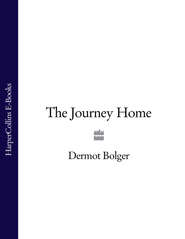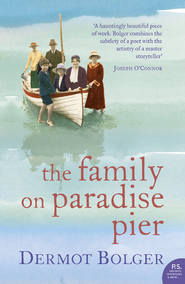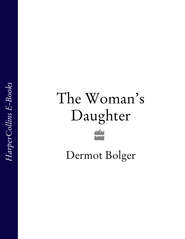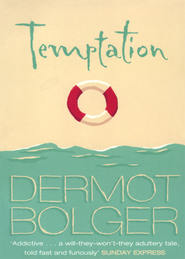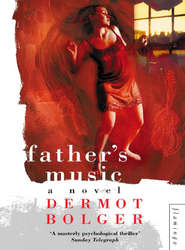По всем вопросам обращайтесь на: info@litportal.ru
(©) 2003-2024.
✖
The Valparaiso Voyage
Автор
Год написания книги
2018
Настройки чтения
Размер шрифта
Высота строк
Поля
Their medieval gates are long felled, their town walls disappeared. An ugly motorway scars the landscape now, necklaced by new estates with Mickey Mouse names. Dublin commuters forced into exile here by rising house prices, resenting their daily drive thirty miles back into the capital and suspicious of locals who are more suspicious of them. Outsiders and blow-ins circling each other around the closed fist of my native town.
‘Navan itself has little to detain you,’ The Rough Guide to Ireland says. A pity that one unfortunate black sailor at the start of the nineteenth century didn’t heed this advice. Hiring a rig of horses when his ship docked in Dublin after a voyage from some exotic foreign port, he took off through the morning rain to explore this land. It was noon when his black horses trotted into Market Square in Navan. He climbed down, his black boots and cloak startling the gaping locals. He found the local tavern and ordered. The innkeeper served him with true Irish hospitality, then withdrew to join the throng on the street, none of whom had ever seen a black man before.
They decided that there was only one person he could be. Old Nick, Lucifer himself come to tempt them. A rope was fetched, a horse chestnut tree selected in the field where my street was later built. It was the final lynching in the Royal County of Meath. This story doesn’t make The Rough Guide, nor any of the historical brochures welcoming visitors in the tourist office on Railway Street. Perhaps it was just a myth invented by Pete Clancy to frighten me as a boy. It certainly succeeded, hearing the creak of a tree at night beyond the outhouse where I slept, expecting to see a dark body still twitching in mid-air if I peeped out through the chicken wire.
Who ordains which stories are remembered and what tales discreetly forgotten in any town? Were there many in Navan who recalled mine, with my family gone? Few would wish to be reminded, in this new traffic-choked prosperity they live in. Yet nobody can control the ghosts that haunt these streets. Lost foreign sailors; starved serving girls who shivered, waiting for their muscles to be felt at hiring fairs; barefoot messenger boys who contracted gangrene by running with open sores through worm-infested horse dung on the cobbles; our local poet, Ledwidge, killed by a stray shell at Ypres and appearing to a friend that same night outside the Meath Chronicle printing works. I just knew that such ghosts existed, because, walking up Flower Hill, I was taking my first step amongst them.
Opening her garden gate everything looked the same, even the way the estate agent watched me from the doorway. Lisa Hanlon’s father had stood in that spot once, an old man who avoided my eye, wary of finally admitting me onto the premises.
I took the estate agent’s brochure and gave a false name and phone number. Not that anyone was likely to recognize me, but I still felt nervous pushing open the sitting-room door. The electric heater set into the old fireplace remained in place, as did the nest of small tables, the thickset re-upholstered armchairs and the long sofa with its lace frills. This room was always too choked with reminders of Lisa’s childhood and mine.
It had felt strange making love to her here, when we were both twenty-two, while her younger self looked down from a gold-framed communion photo. That mouth, which looked so devout after receiving its first wafer of Christ, surprising me by its sudden wantonness.
But at twenty-two I wasn’t that interested in Lisa, to be honest; the attraction behind our brief affair was more about gaining access to this sitting-room. Listening to her parents ascending the staircase, enjoying the sense of danger that they might come back down. I remember Lisa’s astonishment at my ability to grow erect again so quickly after I came. She was quiet and plain. Possibly no man had ever been this passionate in her presence before. But I couldn’t explain how it wasn’t her tiny breasts, still pert as a schoolgirl’s, which excited me. It was being able to fondle the furniture – the uncomfortable cushions on the sofa, the patterned carpet faintly reeking of mothballs, the never-to-be-touched china plates in the sideboard, the ornaments from the parish’s first Diocesan Pilgrimage to Lourdes. The cloying scent of small-town respectability that I was always excluded from.
If Lisa had left me alone on those nights I might have simply carried on making love to the furniture. Here on the lit side of Hanlon’s sitting-room window at last. Not crouched outside in the cold, like on the evenings when I had risked climbing from our outhouse roof down into Casey’s garden next door. Creeping from there into Hanlon’s garden to peep through apple branches at Lisa’s mother drying her only daughter’s hair, reading her bedtime stories, bringing in hot milk and biscuits while they watched television together in winter.
She would switch the light off so that the sitting-room was lit by a glowing coal fire, with images from the unseen television literally transposed across their faces. At least that was how I saw it from outside, at the age of ten and eleven, living out those television programmes at second hand by mimicking the expressions on their faces. I laughed when they laughed and ducked down if they glanced towards the window, even though I knew they could not see me crouched against the hedge.
I could always tap against Casey’s kitchen window and Mr Casey would chance taking me in for an hour to get warm. Some nights I was hungry enough to swallow my pride and risk doing that, though twice I was discovered and beaten for it, with my father shouting at our next-door neighbour across the hedge to mind his own business. But the fact that sanctuary was obtainable in his kitchen made me view Mr Casey as inferior. Hanlon’s house was impenetrable, with its warmth as unimaginable as sex. Hunger didn’t lure me to spy on Lisa’s window. It was to live out a fantasy where I imagined myself allowed to add coal to the fire with the brass tongs and have someone brush my hair instead of yanking at it with a steel comb.
The estate agent coughed in the doorway behind me now. I had forgotten about his presence. Other viewers moved noisily around upstairs, testing the floorboards, checking walls for dry rot, envisaging attic conversions and PVC windows.
‘Why is it for auction?’ I asked.
‘An executor’s sale. The old woman who lived here died. Her daughter lives in England.’
‘Is she home now?’
‘Why do you ask?’ The estate agent was careful of his profit margin. Too many tales of under-the-table bribes to owners, desperate illegal bids from desperate people trapped by the housing shortage in this new booming economy.
‘I’d just feel self-conscious looking around a house if I felt the owner could be watching.’
‘We encourage people to stay away while their homes are being shown,’ the man replied. ‘It’s better for everyone. She’s coming home on Thursday morning for the auction in the Ard Boyne Hotel that afternoon.’ He scrutinized me carefully. ‘At three thirty. You’re leaving it late if you want to bid. Most people have already had it surveyed and are just taking a last look.’
‘I’ve been abroad. I only saw it in the paper today.’
They were the first true words I had spoken. The ad was in the property section of a discarded Irish Independent, which I pocketed at Dublin airport this morning when passing through the first-class section of an Aer Lingus flight from Lisbon. Maybe it was cold feet at actually being back in Dublin, but after the airport coach reached Busaris I’d sat on a bench, too terrified to venture out. When a bus to Navan was announced I had left my bags in a locker and boarded it, thinking that Navan seemed as good a place as any to start my homecoming.
The estate agent walked back out into the hallway to hand a brochure to a young couple, launching into his patter about the south-facing garden and how, with the motorway, it was less than an hour’s drive from Dublin.
Why had I asked him about Lisa? The dead cannot intrude on the living, even to apologize. She was one of the few people to have ever loved me. In return I had abandoned her, lacking the self-confidence to believe that anyone could truly care for me. Before meeting Miriam I had been afraid to let people get close, feeling they would only be disgusted when they uncovered the lice-ridden Hen Boy beneath the thin veneer of normality I’d gained in Dublin. At twenty-two I had been acting out a role every Thursday evening for seven weeks when I had washed and shaved and took the provincial bus back out here from the capital to visit Lisa. One of many roles I’d taught myself to hide behind, whereas Lisa was simply always just herself. Would she have understood if I had broken down and tried to explain the insidious stench of dirt and disgrace I carried inside? How could I, when I didn’t fully understand it myself back then? Instead – after enduring two hours of Country’n’Irish music down the town while we waited for Lisa’s parents to retire to bed – I would make love to her in this sitting-room, never slackening off in my terror that some tenderness might develop if we lay motionless for too long.
Now I pulled out the electric fire to examine the grate behind it. On the first night she brought me home I had been intensely disappointed to discover this two-bar monstrosity blocking the fireplace where flames used to light her face. We’d only met by fluke when snow prevented racing at Newton Abbot and I was forced to return to Navan dog track for the first time in a decade because it was the only place where I could place a bet on a freezing January evening.
‘This heats the room in no time,’ Lisa had said, plugging in the fire, tipsy from the champagne I’d splashed out on after sharing the tote jackpot with six other punters. ‘Don’t worry, I’ve warned my parents never to come down here when I’m with someone.’
But the fire’s dry heat didn’t feel right that night, nor her white skin or deep French kisses. Being real and available, they could never hope to match my gnawing hunger, any more than the gesture of buying champagne could change who I knew I was inside.
‘I used to wonder about you,’ Lisa had whispered afterwards. ‘The way people avoided mentioning you. What did you do to deserve all that?’
As a child I didn’t exactly know what I had done, just that I deserved such punishment and more. Wicked, dirty and dumb. ‘The Hen Boy,’ as Barney Clancy’s son, Pete, christened me at primary school. ‘Chuck, chuck, chuck, chuck – here comes the Hen Boy. Get up the yard and lay an egg, Hen Boy, there’s a smell of shite off you here!’ His taunting voice, two years older, four inches taller, and a dozen social castes above me. The son of my father’s Lord and Master. Children don’t talk in whispers. They understand small-town distinctions and lack adult inhibition about openly shouting them out.
The estate agent returned to hover behind me, concerned lest I damage the electric fire. He probably had a sixth sense to distinguish between potential bidders and nuisance viewers.
‘The house needs work, of course,’ he said, steering me from the sitting-room. ‘But just think what you could do with a little imagination.’
I had no interest in seeing the other rooms, but felt that it would look suspicious to depart. Old people leave something behind them in a house. Not a physical smell or even miasma, but the aftertaste of lonely hours spent waiting for a phone to ring. Everything about the kitchen looked sad – a yellowing calendar from the Holy Ghost Fathers, an ancient kettle, a Formica table that belonged in some museum. Its creeping shabbiness stung me, like a tainting of paradise. One should never go back, especially to Navan – a town so inward-looking it spelt its own name backwards.
Wallpaper had started to droop on the landing, with faint specks of mildew caused by a lack of heat in winter. Finally I was going to see upstairs. Lisa’s voice returned from nineteen years before: ‘Wait till they go on the pilgrimage to Fatima this summer. You can stay over, sleep in my bed. We can really do fun things then.’
A Dublin family clogged the stairwell as I squeezed past, sandwich-board people togged out in an array of expensive logos, trailing an aura of casual affluence behind them. Lisa’s room was empty. I knew it was her room. I had watched her here often enough as a child when she seemed unaware that if she closed the blinds by slanting them down instead of up her outline remained visible. Lisa who spent ten minutes each night brushing her long straight hair; who often stared into space, half-undressed, like her mind was switched off. Lisa aged eleven, twelve and thirteen, when her breasts made that single surge outward so that her body had looked the same silhouetted in this window as when I first saw her properly naked. Some nights she had remained at the window for so long that I feared she suspected me of spying on her. Eventually I had realized that she, in turn, was peeping through her blinds at the outhouse where she presumed that I was sleeping. Perhaps she had been as fascinated by my life back then as I was by hers.
I switched off the bedroom light which the estate agent had left on and raised the blind fully. Hanlon’s garden was now a wilderness with one apple tree cut down and the other besieged by sour cooking apples rotting in the unkempt grass. There was no way that I was going back out there. I had never quite banished their sour taste and the nausea that replaced my night-time hunger if I stole them.
Whoever now owned Casey’s house had built on a Victorian-style conservatory and a patio. A barbecue unit stood against the pebble-dashed wall replacing the hedge which once screened off my old garden next door. My father’s crude outhouse had been knocked down. A pristine building stood in its place, with a slated roof and arched windows strategically angled for light. A trail of granite stepping-stones twisted through a sea of white pebbles up to the newly extended kitchen. A Zen-like calmness pervaded the whole garden. I found my fingernails scraping against the glass.
Two elderly women entered the bedroom behind me, their Meath accents achingly familiar. I knew their names but didn’t turn around in case they recognized something about my face. As a weekend pastime, house viewing seemed like solitary sex – it was cheap and you didn’t need to dress up for it. With no intention of bidding, they gossiped about how much Hanlon’s house would fetch and what their own modernized homes were worth in comparison – immeasurable fortunes, leaving them weak-kneed at the very thought of auctions. I could imagine Cormac mimicking their accents: ‘I don’t know how you held out until it reached the reserve, Mrs Mulready, I’d already had my first orgasm just after the guiding price.’
‘God help any young couple starting out,’ one of them remarked, moving to stand beside me at the window. ‘Didn’t that American computer programmer make a lovely office for himself out in the Brogans’ garden?’
‘Poor Mr Brogan.’ Her companion blessed herself. ‘There was a lovely crowd at his funeral. A terrible way to meet your death. The guttersnipes they have in Dublin now, out of their heads on drugs!’
‘Maybe with all these scandals it’s just as well that he’s gone,’ the first woman said. ‘Mr Brogan was from the old school, not some “me féiner”.’
Her companion tut-tutted dismissively. ‘Sure the Dublin papers would make a scandal out of a paper bag these days. You get sick of reading them. They can say what they like about Barney Clancy now that he’s dead, but they’ve never proved a single thing. That man did a lot for Navan and the more they snipe at his memory the more people here will vote for his son.’
‘Don’t I know it.’ The first woman turned to go, sneaking a quick glance in my direction before dismissing me as another Dublin blow-in. ‘Still you’d feel sorry for Mrs Brogan, no matter what two ends of a stuck-up Jackeen bitch she could be in her day. The papers say she’s not long for this world with cancer.’
They moved on to the front bedroom, talking over my head like I didn’t exist.
I was almost fourteen when I left Navan. By seventeen I’d cultivated a poor excuse for a beard to conceal the onslaught of acne. It was never shaved off until the age of thirty-one. Clean-shaven and bespectacled now (even if the frames only contained plain glass), my dyed hair had receded so much that my forehead resembled my father’s. But I found that I had still sweated in their presence – perhaps half-hoping to be recognized. I touched Lisa’s single bed, kept made up for her during all the years she was away in England. I had never lain between its sheets, as she wanted. Nineteen years ago, on the final night when we returned here from the pub, her mother intruded upon the spell, overcome by curiosity or guilt as she blundered into the sitting-room with a tray of tea and biscuits that I knew Lisa didn’t want.
‘How are you keeping since the family moved to Dublin, Brendan?’
‘I’m keeping well, Mrs Hanlon.’
Her pause, then in a quiet voice: ‘I knew your mother. We went to Lourdes together. The first ever pilgrimage from this parish.’
Mrs Hanlon didn’t say any more. She didn’t need to, the pity in her eyes destroying everything. Their sly plea for forgiveness at having never lifted a finger to help. Suddenly I had ceased to belong in that room. I was an object of sympathy dragged in from outside; the boy raised by his stepmother in an outhouse. Indifference would have made me her equal. Hatred or distrust might have given me strength to screw her precious daughter so hard that Lisa’s cries would summon her mother back down to gape at us among the communion photographs and smashed china and knick-knacks from Lourdes. But her pity had rendered me impotent. Lisa’s parents might have been horrified by what my father did, but – like the rest of this town – they never stood out against him. Only Mr Casey ever did, and he got no thanks from anyone back then in their turn-a-blind-eye world.
After her mother left the room, I knew that Lisa was too nervous to make love. I hadn’t wanted to either. I’d simply longed to vanish back to the anonymity of flatland Dublin where no one knew or cared about me, except that I was Cormac’s slow-witted gambler of a brother, always in the bookies. It hurt me now to recall Lisa’s face as I left that night, aware that something beyond her comprehension was wrong as she urged me to phone and probably continued waving even when I was out of sight. And how I walked out along the blackness of the Dublin road after missing the last bus, although I knew how hard it was to hitch a lift after leaving the streetlights behind.
But I had needed to escape from Navan that night, just like I had to flee from Lisa’s house now. I descended the stairs, left the estate agent’s brochure in the hall, closed the gate and refused to glance towards the house, two doors down, into which my parents had once driven me home with such pride from the Maternity Hospital in Drogheda.
Athlumney graveyard on the Duleek Road out of Navan. Twice a year my father came here – on Christmas Eve and 12 November, my mother’s anniversary. He always arranged for 7 a.m. mass to be said for her on that day, calling me from sleep in the outhouse with an awkwardness that verged on being tender. He’d have rashers and sausages cooked for us to share in silence before anyone else was awake, watching the clock to ensure that we still managed to fast for an hour before communion. We drove, in our private club of two, to the freezing cathedral where the scattering of old women who knelt there glanced up at us. Afterwards in the doorway people might whisper to him, with supplications for Barney Clancy, our local minister in Government, to be passed on through his trusted lieutenant. An old woman sometimes touched my arm in a muted token of sympathy, as I shivered in the uneasy role of being a rightful son again. On our return from visiting the grave, my stepmother Phyllis would be up with the radio on and the spell dissipated for another year.
Standing now beside the ruined castle in this closed graveside I wondered what had possessed him to be buried with his first wife? Was it an act of atonement or another example of miserliness? My father, careful with his pence, even in death. In recent days the doctored version of his life had been freshly carved in gold letters on the polished black marble: Also, her loving husband, Eamonn, died in Dublin…






